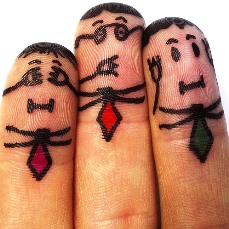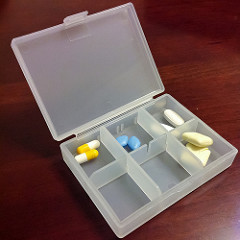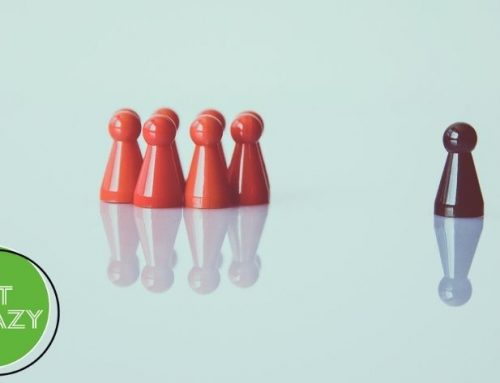 When it comes to psychiatric medications, certain side effects get all the publicity. Everyone discusses the sexual side effects and the increased likelihood of suicide in teenagers. Weight gain
When it comes to psychiatric medications, certain side effects get all the publicity. Everyone discusses the sexual side effects and the increased likelihood of suicide in teenagers. Weight gain (or even the less common weight loss
(or even the less common weight loss ) is another side effect that is often discussed.
) is another side effect that is often discussed.
There are literally hundreds, if not thousands, of other possible side effects. If you count the side effects that taking two different medications at the same time can produce, the number soars even higher. However, most of these side effects are exceptionally rare and often avoidable by working with your doctor.
There are a few common side effects that many people who take psychiatric medications live with and manage to cope with. These aren’t discussed frequently, but if you sit in a mental health support group, you’ll likely find at least a couple participants who tolerate them.
support group, you’ll likely find at least a couple participants who tolerate them.
Common Psychiatric Medication Side Effect Number 1: Taste Changes
Medication is serious business and is designed to change the way your body works. The point of medication is to help your body do something that it’s not doing efficiently on its own. In some cases, certain medications will literally change the way food and drink taste to the person taking them.
This means that a food or drink you loved before taking the medication may now taste different, or even bad. This may seem like an insignificant effect – and often is – but imagine if you woke up one morning and Mom’s meatloaf, or other favorite comfort food, tasted terrible? It can be a jarring side effect that causes a lot of confusing, uncertain, and unhappy feelings.
Common Psychiatric Medication Side Effect Number 2: Memory Issues
Any medication designed to modify the way your brain functions is also going to impact memory on some level. There is a spectrum of effects that needs close attention.
attention.
On the worst end, the medication could cause serious memory loss. Much more common, however, is causing forgetfulness or difficulty in focusing or concentrating. Losing any mental capacity is a big deal, however, and it represents a compromise on the part of the person taking the medicine. It once led me to say that I’d rather have partial control over a working brain than full control over a broken one.
Common Psychiatric Medication Side Effect Number 3: Frequent Urination
 While none of these side effects have quite the impact of doubling a person’s body weight
While none of these side effects have quite the impact of doubling a person’s body weight or removing a person’s ability or desire to have sex, they do represent a loss. Living with the side effects of medication, even “easy” ones, means the person taking them has to give up something.
or removing a person’s ability or desire to have sex, they do represent a loss. Living with the side effects of medication, even “easy” ones, means the person taking them has to give up something.
No one wants to accept less than 100% of anything and learning to compromise on health issues can be a delicate matter. I never thought that I’d be okay with losing a part of my memory in exchange for less depression. It was a difficult and unfair choice, but it is one that most people living with mental illness
can be a delicate matter. I never thought that I’d be okay with losing a part of my memory in exchange for less depression. It was a difficult and unfair choice, but it is one that most people living with mental illness face.
face.
For that, we deserve to be commended.
**This article originated appeared on Psych Central as, “3 Common Psychiatric Medicine Side Effects No One Talks About.”








HI Gabe, thank you for your website.
I had a date with the most incredible man I’d ever met. He asked my mom’s permission to marry me 1 week later and then proposed formally 2 weeks after than. I was happy. Everything just clicked for us perfectly, even though it was such a short time knowing eachother, I could honestly say, I love him and he’s my ultimate partner.
Out the blue- Sunday 2 weeks ago at 23h00, I had a normal man who had started a new job round about the same time he proposed he had started a new job. He switched professions about a year ago and was struggling to keep a job in this new profession given his lack of experience and had a lot of stress, but we were happy.
At 23h00 on a Sunday he sent a normal message, babes if you still out with your friend, then send her my best and tell her we’ll see her for a double date on Wednesday. At 23h02 he started calling me a hippo, accused me of interfering with his sleep, accused me of interfering with his food, of lying to him. The messages came thick and fast and until 2am.
then the messages started again from 7am on Monday until 7pm that evening, when he called me up, told me that I’m a liar and a dishonest person, demanded his engagement ring back and became this difficult human being. I gave him his stuff, his ring and moved on with my life. But as he kept my keys I needed them back, I went to meet him yesterday. We hadn’t spoken because I was in his mind, personal non-grata #1.
The messages, I realised by around 1pm on Monday, was not normal. The thoughts were all over the place and I described it as a scene from a beautiful mind and called his dad to ask if there’s a history of mania/psychosis/bipolar which he and my fiance’ denied, but both agreed that he needs a psychologist/ basic therapy.
In my heart, I know that he is bipolar. Yesterday, he lost his job again, but there was a peace between us and he said he loves me, and wants to marry me, and will go to a psychologist ( not a psychiatrist) and he knows that he is impulsive and can be obsessive and build things up in his mind. He admitted that he thought that I was cheating. In fact, he even concocted in his mind that his dad was in love with me and we were having an affair!
I love him, but I don’t know which stories are true and not true. I’m asking you, IF he goes for help and is on the right medication, assuming that we are good together in every other aspect, and we are. (1) what is it like to live and marry a bipolar person in remission (2) how do you trust him to remain in remission and what if he stops taking his pills for instance? (3) how long does it take to get on the right medication (4) can I have a child with this man, or will the child have a huge chance of also being manic?? (5) is what I described, in your mind, bipolar/personality disorder/ mania/ some kind of psychosis etc etc?
(6) this is a man who speaks 3 languages, was an outstanding sportsman, has empathy for animals, is a romantic, is articulate, was an officer in the Israeli army and passed rigorous psychology testing, likes children, has a masters in engineering from an excellent university. Is this possible?? To be all this and have a personality disorder? Is it possible that he merely has bad luck with jobs or that he simply can’t keep one because of his mania?
And he wants to marry me, he does love me. Should I go back? How do I trust? Please help me with the facts and the probability and what to do?